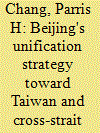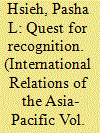|
|
|
Sort Order |
|
|
|
Items / Page
|
|
|
|
|
|
|
| Srl | Item |
| 1 |
ID:
134077


|
|
|
|
|
| Publication |
2014.
|
| Summary/Abstract |
For almost a decade, Beijing has pursued a "soft" approach toward Taiwan, cultivating economic ties and political exchanges in its pursuit of reunification. Following the end of President Chen Shui-bian's term in office, which was marked by constant tensions and several crises with China, Beijing has colluded with his successor, Ma Ying-jeou to pursue a policy of economic integration with the mainland. Beijing's
strategy toward Taiwan under Chairman Xi Jinping and his predecessor Hu Jintao has yielded positive results. The approach not only avoids possible military conflict with the United States, but receives support from Washington. Beijing's economic means, such as the Economic Cooperation Framework Agreement (ECFA), have enhanced Taiwan's economic integration with China and greatly increased the
PRC's control over Taiwan's economy and society, helping to lock Taiwan into the mainland's orbit. Likewise, Beijing has developed tools that allow it to intervene directly in Taiwanese domestic politics. However, efforts to use ties with President Ma to bring Taiwan farther into the PRC orbit have backfired, resulting in a weakened presidency that cannot deliver Beijing's goals. Thus, Beijing appears to be looking ahead to the next two elections, trying to make as much progress as possible before Ma leaves office, while simultaneously trying to establish ties with possible successors and the opposition DPP. In 2012, Beijing's intervention assisted the reelection of President Ma. It is sure to try again in Taipei's mayoral election in 2014 and the presidential/parliamentary elections in 2016.
|
|
|
|
|
|
|
|
|
|
|
|
|
|
|
|
| 2 |
ID:
152156


|
|
|
|
|
| Summary/Abstract |
Donald Trump, the 45th President of United States heightened tensions with China when he exchanged a telephonic call with the President of Taiwan Tsai Ing-Wen and soon after declared that the country might challenge the One-China policy that it had previously acknowledged (Blanchard & Holland, 2017).
|
|
|
|
|
|
|
|
|
|
|
|
|
|
|
|
| 3 |
ID:
168229


|
|
|
|
|
| Summary/Abstract |
This article examines the evolution of Taiwan’s relationship with Singapore since the 1960s as a unique case study in the Asia-Pacific. The theoretical concept of recognition in international relations (IR) and its nexus with international law are used to analyze the conclusion of the bilateral military and trade agreements absent diplomatic relations. The article argues that beyond security dimensions, the two states’ struggles for recognition exhibit the formation of national identities, which invigorate the claims for sovereign state status in global politics. First, this article explores the emerging notion of recognition in IR and sheds light on the significance of Taiwan’s presidential visit to Singapore under its one-China policy. Second, it explains Singapore’s pursuit of external sovereignty that led to substantive defense cooperation with Taiwan, as well as the role of Lee Kuan Yew in facilitating Beijing–Taipei negotiations. Finally, it assesses contemporary developments such as the inking of the Taiwan–Singapore free trade agreement and the first-ever summit between the presidents of China and Taiwan in Singapore. Hence, the political and legal analysis of Singapore–Taiwan relations enriches the study of IR and contributes to the understanding of the foreign policy of China and the Association of Southeast Asian Nations.
|
|
|
|
|
|
|
|
|
|
|
|
|
|
|
|
| 4 |
ID:
174077


|
|
|
|
|
| Summary/Abstract |
The article examines the evolution of Taiwan’s engagement in Southeast Asia since the 1990s as a unique case study in international law and international relations (IR). Under the one-China policy, the evolution of bilateral relations with Taiwan highlights the theoretical concept of recognition premised on identity and status in interstate affairs. The article argues that the states of the Association of Southeast Asian Nations (ASEAN) have established diverse forms of recognition of Taiwan in line with a policy of non-recognition. While such recognition has not amounted to recognition of statehood in international law, it demonstrates the IR concept of recognition as a gradual process in state practice. To substantiate the contention, the article examines the diplomatic privileges and immunities that ASEAN countries have accorded to Taiwan. The conclusion of bilateral trade and investment agreements has also galvanized various modes of recognizing Taiwan’s treaty-making capacity and the legitimacy of official cooperation. Hence, the findings not only enrich the study of IR, but also contribute to a broader understanding of the role of China and contemporary Asia–Pacific politics.
|
|
|
|
|
|
|
|
|
|
|
|
|
|
|
|
|
|
|
|
|